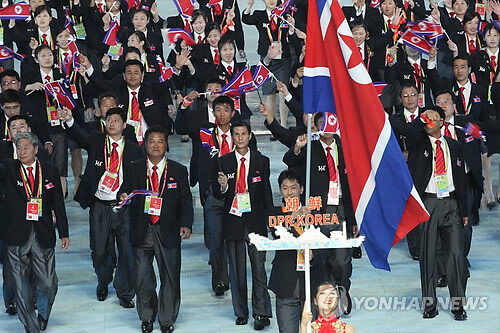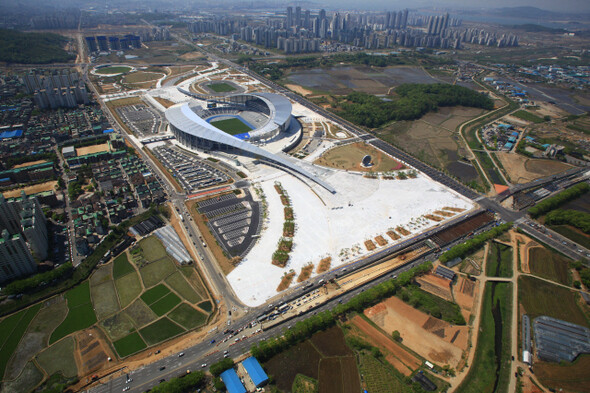hankyoreh
Links to other country sites 다른 나라 사이트 링크
North Korea officially announces participation in 2014 Incheon Asian Games

By Lee Yong-in, staff reporter
With North and South Korea unable to find a way to repair relations, North Korea officially announced on May 23 that it would be sending a delegation of athletes to the 2014 Asian Games, which will be taking place in Incheon in September.
On May 23, North Korea’s state-run Korean Central News Agency (KCNA) reported that “as a member state of the Olympic Council of Asia, which espouses the ideals of peace, unity, and amity, the DPRK Olympic Committee decided to send a delegation of North Korean contestants to the 17th Asian Games, which will be held in Incheon from Sept. 19 to Oct. 4.”
Pyongyang’s official announcement of its participation in the Asian Games comes after several months of uncertainty. Indeed, North Korea had already stated in January that both its male and female soccer teams would be competing in the soccer games in Incheon.
While this was not an official announcement that North Korea would be competing in the games, the general view was that, if Pyongyang was sending the men’s and women’s soccer teams, there was a high likelihood that North Korean teams would also participate in other categories. Even then, it seemed like only a matter of time before North Korea made its official announcement.
But during February and March, friction on the Korean peninsula increased because of the joint US-ROK military exercises. As North Korea rejected President Park Geun-hye’s Dresden Declaration and reacted with dismay to the results of the summit between Park and US President Obama, and as the South Korean government overreached in its attempt to downplay the Sewol tragedy, inter-Korean relations kept backtracking. The outlook for North Korea’s participation in the Asian Games started to look doubtful.
Given this background, the ramifications of North Korea’s decision to participate in the Asian Games in Incheon go beyond the realm of sports, and could be a political signal. The decision could signal Pyongyang’s desire to show that it still hopes to achieve reconciliation and cooperation in inter-Korean relations.
More broadly, North Korea’s decision may tie in with its vigorous campaign to bring in foreign funds through economic development zones. Taking part in the Asian Games would be one way of building a positive reputation, showing itself to be a full-fledged member of the international community and a “normal state.”
The discussions between North and South over how to accommodate the North Korean athletes and their supporters will mean more contact between the two sides. Used effectively, the meetings could be lead to improvements in inter-Korean relations. But it’s not yet clear if they are capable of generating a major advance, with North Korea not only taking part in the Games but joining the South to field a unified team or taking part in a joint statement, joint support for the teams, or a joint performance - possibilities that the Ministry of Unification said it was ruling out last April.
North Korea’s announcement also fails to square with its consistently aggressive military stance, including its Southwest Front Command’s threats on May 21 about directing targeted attacked on South Korean naval vessels.
Yang Moo-jin, a professor at the University of North Korean Studies, called Pyongyang’s approach “a strategy of separating different issues,” meaning sports and politics.
“In terms of national security, they want to show that everything’s in good order, but at the same time they want to continue social and cultural exchange with things like [South Korean] Cardinal Andrew Yeom Soo-jung’s visit to the Kaesong Complex and sporting events,” Yang explained.
North Korea’s decision to take part in the Incheon Asian Games brings the total of Olympic Council of Asia (OCA) members participating up to 45. It also came relatively swiftly compared to the 2002 Asian Games in Busan, when North Korea waited until a month before the event opened to announce it was taking part.
The Incheon Asian Games organizing committee said North Korea’s participation was officially confirmed through the OCA.
“We determined early this year that the response from North Korea was positive, and we figured out lodging, expenses, and transportation for an inter-Korean team on the assumption that North Korean players would take part as they have in the past,” the committee explained. “So we’re not expecting any major issues.”

Please direct questions or comments to [english@hani.co.kr]

Editorial・opinion
![[Column] Has Korea, too, crossed the Rubicon on China? [Column] Has Korea, too, crossed the Rubicon on China?](https://flexible.img.hani.co.kr/flexible/normal/500/300/imgdb/original/2024/0419/9317135153409185.jpg) [Column] Has Korea, too, crossed the Rubicon on China?
[Column] Has Korea, too, crossed the Rubicon on China?![[Correspondent’s column] In Japan’s alliance with US, echoes of its past alliances with UK [Correspondent’s column] In Japan’s alliance with US, echoes of its past alliances with UK](https://flexible.img.hani.co.kr/flexible/normal/500/300/imgdb/original/2024/0419/2317135166563519.jpg) [Correspondent’s column] In Japan’s alliance with US, echoes of its past alliances with UK
[Correspondent’s column] In Japan’s alliance with US, echoes of its past alliances with UK- [Editorial] Does Yoon think the Korean public is wrong?
- [Editorial] As it bolsters its alliance with US, Japan must be accountable for past
- [Guest essay] Amending the Constitution is Yoon’s key to leaving office in public’s good graces
- [Editorial] 10 years on, lessons of Sewol tragedy must never be forgotten
- [Column] A death blow to Korea’s prosecutor politics
- [Correspondent’s column] The US and the end of Japanese pacifism
- [Guest essay] How Korea turned its trainee doctors into monsters
- [Guest essay] As someone who helped forge Seoul-Moscow ties, their status today troubles me
Most viewed articles
- 1[Column] The clock is ticking for Korea’s first lady
- 2After 2 months of delayed, denied medical care, Koreans worry worst may be yet to come
- 3[Column] Has Korea, too, crossed the Rubicon on China?
- 4US overtakes China as Korea’s top export market, prompting trade sanction jitters
- 5[Correspondent’s column] In Japan’s alliance with US, echoes of its past alliances with UK
- 6Hong Se-hwa, voice for tolerance whose memoir of exile touched a chord, dies at 76
- 7All eyes on Xiaomi after it pulls off EV that Apple couldn’t
- 8[News analysis] After elections, prosecutorial reform will likely make legislative agenda
- 9More South Koreans, particularly the young, are leaving their religions
- 10John Linton, descendant of US missionaries and naturalized Korean citizen, to lead PPP’s reform effo